Recently UHST has been helping Isaac Newton School to smarten up the school site for the new intake of students.
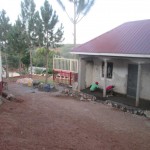 A gate house is nearing completion. This is the place where visitors will be welcomed to the school. It has a room for the bursar and for the cashier, and parents and guardians will be able to pop in to pay school fee instalments, as well as to make general enquiries.
A gate house is nearing completion. This is the place where visitors will be welcomed to the school. It has a room for the bursar and for the cashier, and parents and guardians will be able to pop in to pay school fee instalments, as well as to make general enquiries.
 In 2015 the school had a problem during storms, when water rushed down the hillside and deposited water and mud in the classrooms. To prevent this from happening in future a wall has been built and drainage channels dug to lead the water away from the school buildings. This has been a major job, which has required a large amount of earth moving.
In 2015 the school had a problem during storms, when water rushed down the hillside and deposited water and mud in the classrooms. To prevent this from happening in future a wall has been built and drainage channels dug to lead the water away from the school buildings. This has been a major job, which has required a large amount of earth moving.
At the same time the contractors have improved the main roadway into the school and constructed all-weather paths between the classrooms and dormitories.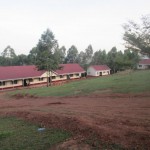
Following the excellent examination results, published in January, the school has had a healthy recruitment taking 74 new students into Senior 1 and 32 students into Senior 5 (the Lower 6th of A-level).
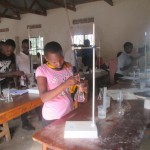 Already the new students are hard at work. The picture left shows the new Senior 5 Chemistry Students carrying out a Red-ox titration ( a titration between acidified Potassium Manganate (VII) and Oxalic acid). Of the 32 students in Senior 5, 11 students have opted for Chemistry and many more are taking sciences with combinations such as: Physics, Chemistry and Mathematics, Physics, Chemistry and Biology, Physics, Economics and Mathematics, Biology, Chemistry and Mathematics etc.
Already the new students are hard at work. The picture left shows the new Senior 5 Chemistry Students carrying out a Red-ox titration ( a titration between acidified Potassium Manganate (VII) and Oxalic acid). Of the 32 students in Senior 5, 11 students have opted for Chemistry and many more are taking sciences with combinations such as: Physics, Chemistry and Mathematics, Physics, Chemistry and Biology, Physics, Economics and Mathematics, Biology, Chemistry and Mathematics etc.
Last week Carl Blackburn, the new CEO of IHEU visited the school. The picture right shows him sitting with the school’s headteacher surrounded by new first year students.
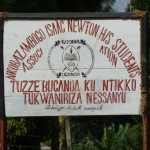 A Humanist Volunteers Association has been established at the school. This allows students to go out to do good works in the neighbourhood, such as clearing the compounds of elderly people living on their own and environmental improvements. The picture on the left shows the sign for the Humanist Volunteers.
A Humanist Volunteers Association has been established at the school. This allows students to go out to do good works in the neighbourhood, such as clearing the compounds of elderly people living on their own and environmental improvements. The picture on the left shows the sign for the Humanist Volunteers.
Below is the school calendar, which displays proudly the school’s Humanist motto “To Reason not to Believe”.

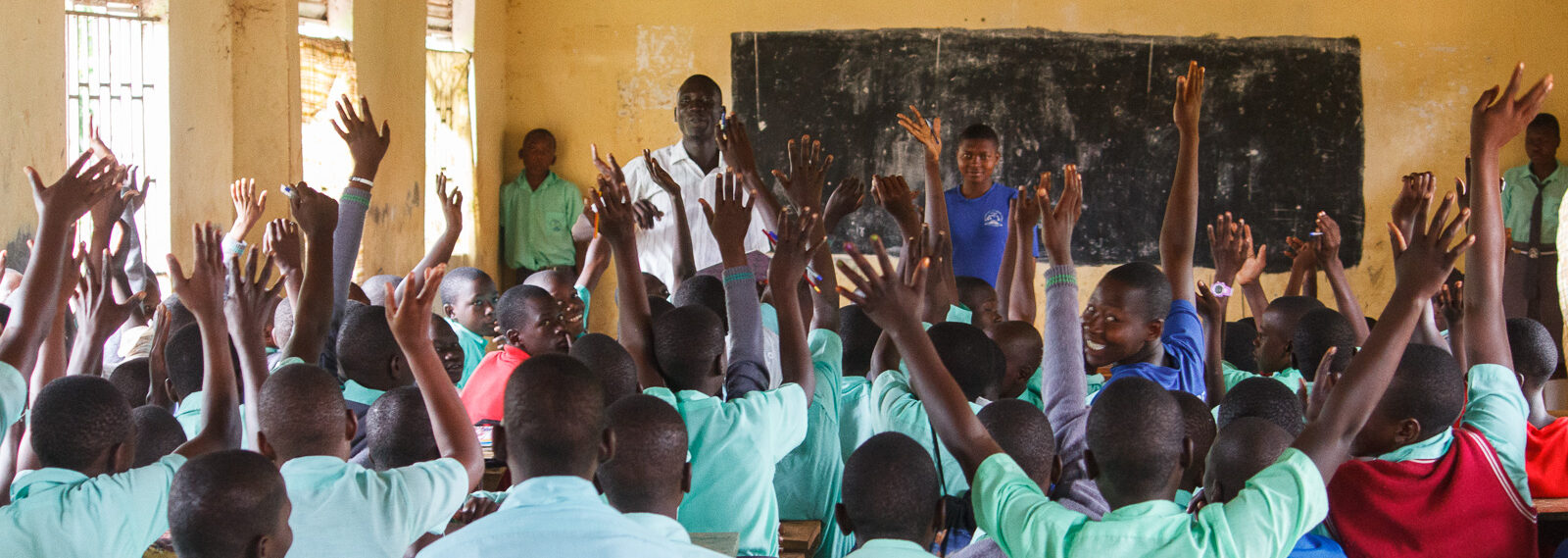
Posted: May 25, 2016 by Steve Hurd
University success at Isaac Newton School
Samuel is naturally delighted by this life changing achievement. He says: “scoring 15 points in my subject combination of Biology, Chemistry, Mathematics with subsidiary Information Technology has been the greatest achievement of my life. My scores were Biology C, Chemistry C, Maths B, General paper 4 and ICT 3. This has only been possible due to receiving a scholarship from UHST to study for free at Isaac Newton High School.
I have been admitted to Makerere University on a government scholarship to study Bachelor of Science in Agriculture. However, the scholarship only covers the basics. Fortunately, Isaac Newton High School will allow me to pay my way through university in exchange for doing part-time teaching in the school.
When I graduate I intend to return to my community and help them to improve their agricultural practices and incomes by promoting sustainable agriculture.
I am very grateful to Birmingham Humanists who provided my scholarship and made it possible for me to achieve this in my life.”
Samuel is just one example of how the work of the Humanist Schools in Uganda can completely transform the life chances of the individual students passing through them.
Posted: March 29, 2016 by Steve Hurd
Isaac Newton High School Update
Recently UHST has been helping Isaac Newton School to smarten up the school site for the new intake of students.
At the same time the contractors have improved the main roadway into the school and constructed all-weather paths between the classrooms and dormitories.
Following the excellent examination results, published in January, the school has had a healthy recruitment taking 74 new students into Senior 1 and 32 students into Senior 5 (the Lower 6th of A-level).
Last week Carl Blackburn, the new CEO of IHEU visited the school. The picture right shows him sitting with the school’s headteacher surrounded by new first year students.
Below is the school calendar, which displays proudly the school’s Humanist motto “To Reason not to Believe”.
Posted: March 28, 2016 by Steve Hurd
Mustard Seed School wins District Football Competition
The trophy is now proudly displayed in the school office.
The success was covered in the local newspapers and on local radio.
The team has now been invited to participate in the regional football competitions, which are being held in neighbouring Mayuge district for a week from the 9th April. Participating in such events is costly but they bring good publicity for the school and they are a great confidence and team-building experience for the students involved. UHST has decided to help them out with the costs of travel and subsistence to enable the boys to take part in the regional finals.